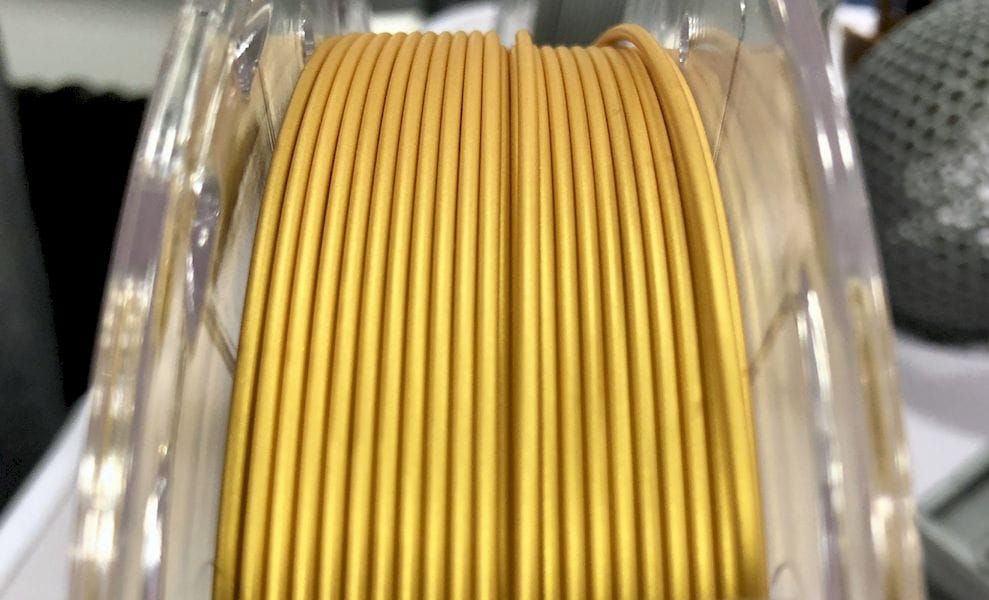![PLAS3D 3D printer filament laying neatly - and staying - on a spool [Source: Fabbaloo]](https://fabbaloo.com/wp-content/uploads/2020/05/plas3dov-1_result_img_5eb0a985c5190.jpg)
We finally managed to test a sample of PLAS3D’s filament, and boy, we are impressed!
There are plenty of PLA material options available these days, so it is becoming increasingly challenging for any vendor to stand out among the crowd. Most 3D printer filament providers have opted for including more exotic materials on their product shelves, but PLAS3D has pursued an unusual differentiation option that I have not seen on any other 3D printer filament.
Let me explain the issue first. 3D printer filament is made in a pretty much standard way by almost every provider:
- Raw thermoplastic pellets are heated to a slurry state
- Precise coloration from a masterbatch are added and mixed in
- The slurry is extruded through a nozzle at a precise speed to ensure consistent diameter
- The fresh filament travels through a temperature controlled bath to cool it down
- It’s wound up on a large take-up spool to capture an entire batch of production
- The large take-up spool is de-spooled onto smaller end user-sized spools
- The spools are baked to disperse any moisture
- The spools are bagged and boxed for shipment
But there’s one horrible problem with this approach: the fresh filament cools in a coil diameter that matches wherever it is on the larger take-up spool. Thus your filament inevitably “wants” to be on a larger diameter spool than it’s eventually mounted.
This means it tends to spring off. And that looks like this:
![Tangled 3D printer filament exploding off a spool [Source: Fabbaloo]](https://fabbaloo.com/wp-content/uploads/2020/05/image-asset_img_5eb0a98643e85.jpg)
But this phenomenon is entirely absent from PLAS3D’s filament. Check out the image at top and observe how regular the filament is laying. Also note that it is NOT TIED DOWN. The filament could spring away wildly, but it does not.
Why? Because PLAS3D has somehow figured out how to spool the fresh filament at the correct end user spool diameter.
This stuff is amazing; it simply stays very well behaved on the spool, unlike any other filament I’ve used.
We obtained a spool of gray PLA and gave it a test.
![PLAS3D 3D printer filament sits very nicely on its spool (Ignore the green guy in the background, please!) [Source: Fabbaloo]](https://fabbaloo.com/wp-content/uploads/2020/05/image-asset_img_5eb0a986ab563.jpg)
Mounted on a 3D printer, the PLAS3D spool sits very quietly and does not spring out in any direction.
![A #3DBenchy printed with PLAS3D filament - looks amazing! [Source: Fabbaloo]](https://fabbaloo.com/wp-content/uploads/2020/05/image-asset_img_5eb0a98723632.jpg)
The #3DBenchy turned out excellent, as you can see. But if you look closer, you can actually read the name on the back of the ship – and you probably didn’t even realize there WAS a name there!
![You can even read the ship's name on the back! [Source: Fabbaloo]](https://fabbaloo.com/wp-content/uploads/2020/05/image-asset_img_5eb0a98784c6e.jpg)
Several tests were quite successful, like the CTRL-V test:
![The CTRL-V test, using PLAS3D filament. A little stringing, but all features look pretty decent for this very tiny test [Source: Fabbaloo]](https://fabbaloo.com/wp-content/uploads/2020/05/image-asset_img_5eb0a987f24bc.jpg)
The bridging and pathological warp tests worked very well, too:
![Other test results using PLAS3D filament [Source: Fabbaloo]](https://fabbaloo.com/wp-content/uploads/2020/05/image-asset_img_5eb0a9885bb1e.jpg)
We printed a Robert head, our favorite test object, and it came out great as well:
![A very smooth 75mm Robert head test, 3D printed with PLAS3D filament [Source: Fabbaloo]](https://fabbaloo.com/wp-content/uploads/2020/05/image-asset_img_5eb0a988b3936.jpg)
Can you buy PLAS3D filaments? Yes and no. They don’t yet have an online store open, and instead they market directly to larger consumers. They say:
We currently partner with different companies / organizations including manufacturers, printing hubs, universities and government.
Hopefully they will open up sales to the public directly soon.
Via PLAS3D

